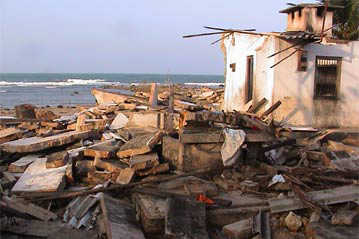
| Home |
| Where is Fort Galle? |
| Galle City |
| Galle Fort |
| Travelling Around |
| Places to See |
| Best Places to Stay |
| Shopping |
| 2004 Tsunami |
| Galle, Sri Lanka Today |
| Useful Resources |
| Resources |
The Indian Ocean Tsunami of 2004
It was the day after Christmas and most of the islands were in a celebratory mood. It was also Boxing Day in other countries. No one expected a disaster of this magnitude to hit the islands but on that fateful day on December 26, 2004 an earthquake with the magnitude of 9.0 on the Richter scale which originated in the Indian Ocean just north pf Simeulue island off the western coast of northern Sumatra, Indonesia triggered a giant tsunami that wiped out all structures along the shores of Indonesia, Sri Lanka, South India, Thailand, and other countries with waves that went up as high as 100 feet or 30 meters from the shoreline. The resulting damage and death went as far as the coast of Africa even as far as Port Elizabeth in South Africa which was already 5,000 miles away from the epicenter. The tsunami was among the deadliest disasters in modern history, killing well over 310,000 people.
In Sri Lanka, the devastating effect of the deadly tsunami saw 31,000 people dead, several thousands missing and 1,000,000 homeless all across the country. The destruction on this quiet little island is such that experts believe it would take billions of dollars to bring it back to its former glory.

Immediately following the disaster, Galle was unrecognizable. Gone was the peaceful sandy little lowland dotted with magnificent villas. In its place stood roadsides strewn with dead bodies and debris from homes that were wrecked beyond recognition. Fishing boats were scattered everywhere like broken toys.
The impact of the disaster on the city of Galle is disheartening especially to its residents who fear that it has meant the loss of traditional livelihood and history of the devastated areas. Up to now they live in constant fear of the sea which they blame for their current circumstances.
They are dismayed and frustrated at the perceived slowness by which the Sri Lankan government seems to be dispensing help and reconstruction efforts especially considering the windfall of donor pledges. There is even talk of misappropriation of relief funds and supplies as well as the rechanneling of the windfall to election coffers. The feelings of unrest and frustration are expected to continue until such time when the government begins groundwork in places like Galle.
The development and preservation of Galle's cultural heritage has hit a slump with the hope for the opening of its maritime museum slowly fading as a result of the devastating loss of thousands of centuries-old treasures buried underwater in shipwrecks and painstakingly collected in the seabed of Galle port over a period of nine years. The maritime museum and its exhibits would have showcased the Sri Lanka's maritime heritage which it shared with its European invaders and Arab traders.